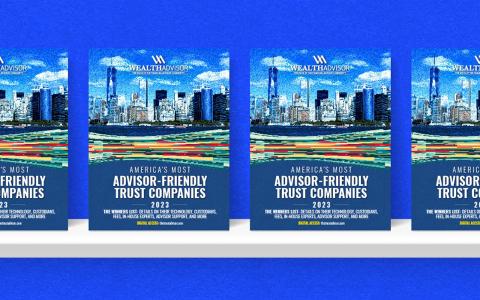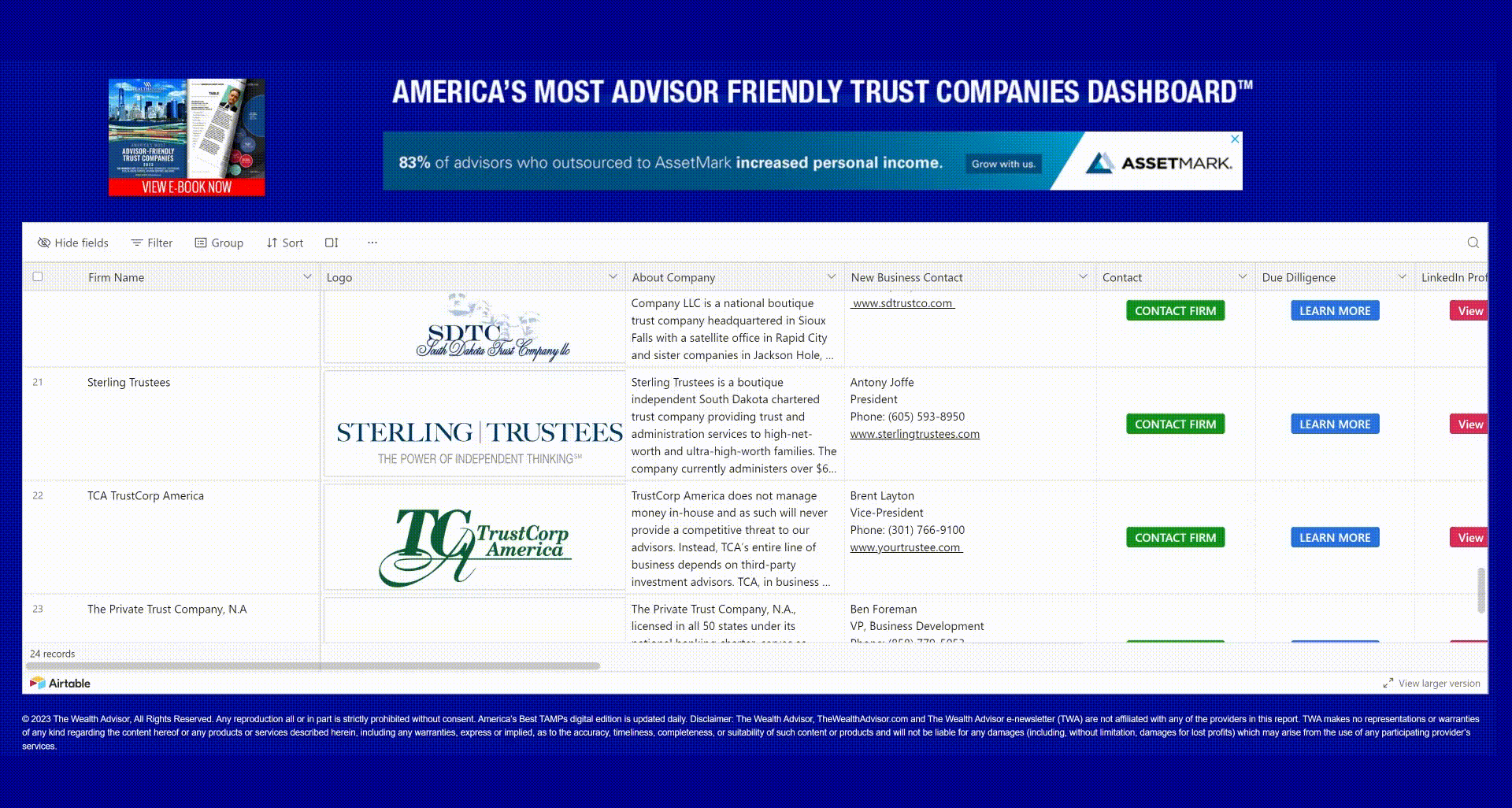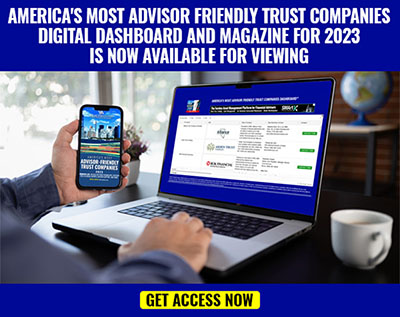
Did you know trustee fees offered by some of the best advisor-friendly trust companies have gone DOWN over the past 2 years!
Better technology and streamlined trust administartion have reduced costs for many, and as a result passed on savings to clients.
But, which trust firms offer lower fees, and when you choose those firms, will you be receiving quality services?
Here's you only single source to find out who is charging what for trust services: The 2023 edition of America's Most Advisor-Friendly Trust Companies, alongside our cutting-edge Digital Dashboard™
These complimentary resources cover what they charge and much more. You should check-out this new edition help your client navigate in this often "closed circle" community who prefer to you to call first, before knowing the what the charge.
The 2023 edition and dashboard will provide you with up-to-date information on 24 trust companies, offering comprehensive details and insights into the industry's leading trust services .... including what they charge.

Capacity is now the only constraint with HNW families aware of their mortality and terrified of tax liability. The window is closing to pick your partners.
2023 hase been a wild ride. Three years ago, a new virus hit the world and every Baby Boomer with money got a sharp incentive to revisit the estate plan.
Since then, volatility never let up once through bubble to bear . . . and now, we're all older and one way or another, closer to the end of the line.
Clients are older. We're older. We're looking to retire and pass on the book of business to successor advisors. The clients are looking toward their ultimate asset transfer to the next generation as well.
Some of the most dynamic corporate trustees in the country, the ones we track in our annual Advisor-Friendly Trust Companies guide started telling us they had too much new business coming in than they could handle.

On the whole, they were equipped to deal with the operational challenges of sending employees home and running face-to-face meetings online. But many of their rivals were less prepared and got caught in the lurch.
Their clients, their partners and their partners’ clients paid the price. Nobody wants that. Once you’ve been burned, you make sure to keep your eye on the exits closest to your seat.
And if you’ve been dodging the question of integrating the estate plan into your practice entirely, this might be your last chance to get in the game.
Even now, appointment books are filling up across the trust industry. There just aren’t enough slots.
The best and most advisor-friendly trust companies will do what they can for their best friends. But this year there’s a little more urgency in the air.
If you don’t have your trust referrals locked down, you need to download the new AFTC guide NOW. For that matter, even if you think you’re covered, it’s nice to get backup in place now.
This year's guide is different because it's both a static directory of industry players and a dynamic online spreadsheet that updates on the move. This is the post-pandemic world, where information needs to be available in real time.
After all, we think you'll be doing a lot more shopping this year. You want to give your clients a smooth experience, no matter what happens. “No” is a hard word to say, especially in a crisis.
Death and Taxes
Personal disclosure: we had to update two generations of estate plans within the family recently. The experience was smooth enough, but there was an unusual amount of strain around the logistics.
Teleconferencing just wasn’t part of the client culture for many firms a year ago. It makes sense. A lot of Baby Boomers have learned to love their phones, but they’re still more comfortable conducting professional relationships in the office.
Lockdown put a stop to that and forced a lot of people to rethink their entire client cycle on the go. Without a period for testing, glitches are practically inevitable
And we were far from the only unexpected client cycle people had to deal with. There were a lot of battlefield promotions in the industry last year as people got sick or needed to reach for added capacity to handle unexpected loads.
Usually this is a calm, relatively quiet corner of the financial landscape. Estate plans used to evolve on a generational basis, with decades between meaningful revisions.
But COVID accelerated that tempo by reminding Baby Boomers with money that it’s infinitely better to anticipate potential threats than wait in line with everyone else when worst-case scenarios turn real.
They’re still one of the biggest generations in U.S. history and the pandemic got worse the older you were. Meanwhile, the market was crashing, triggering emergencies as well as once-a-decade opportunities to shuffled assets at temporarily depressed valuations.
Then you’ve got the tax situation. As the year wore on, people woke up to the prospect that a government that needed to spend trillions on stimulus would ultimately need to raise revenue from people with money.
Taxes probably won’t soar immediately, but it’s pretty clear that rates are unlikely to get much lower in the immediate future either. This is “as good as it gets.”
“Lock it in while you can.” One way or another, that’s the essence of every good tax accountant and estate planner’s advice. Challenges and opportunities cycle as the pendulum of life swings between extremes.
Success often derives from capturing the opportunities while they’re in reach . . . otherwise, they might not be available when you need them. And needless to say, whenever you can watch a challenge play out from the sidelines, you’ve conserved vital resources for the next cycle.
It works like the market. Traders don’t buy high if they can help it. They buy the dip and try to time an exit at the top.
When taxes have gone as low as they can and are on the way back up, lock in known liabilities at current rates. If loopholes are closing, grab them before they disappear. Lock those in too.
On the verge of a recession, shield assets from both volatility and public view. You don’t want your clients to draw attention in an impoverished and angry environment where lawsuits trigger bankruptcy and vice versa.
And when mortality is especially close, locking in directives to the next generation gets more crucial with each passing day. When the pandemic hit, every investor should have started reviewing the family estate plans.
The trust companies in our universe were ready for each and every one of these developments. They responded to a crisis year with vigor and even a little grace, helping their clients lock in what they had before the world shifted.

Others were not so lucky. Systems they thought would work on a hypothetical basis crumbled under the load.
Waking Up To A Faster-Paced World
Everyone is more aware of the route to the lifeboats now. Nobody wants to get stuck without access to fast dynastic support when life and death get in the way.
The tax picture looks even more challenging now. The rules will change faster as the government reels. This is not a partisan statement. It’s just how the long pendulum swings.
Change feels fastest at the inflection points. We live in a faster-paced world now anyway. The technology-driven news cycle has seen to that.
Estate plans that could be filed and forgotten for decades now benefit from annual review to keep up with swinging asset prices, rotating loopholes and the simple realities of human existence.
That’s a headache forcing everyone in the business to get more responsive, running more review and revision cycles for every client. Everything needs to be as fresh as possible.
You never know when the world will twist. If you don’t have backup referral capacity to help your best clients keep their estate plans fresh, you need to lock it down now.
Conversations that should have happened years ago need to happen. Some didn’t happen. Clients passed on, the planning opportunities vanished, relationships frayed and slipped away.
We’ve argued, begged and once in a while even tried to trick the advisory community into opening up to trust services over the years. There’s still time, but the clock is ticking very loudly now.
The rewards are worth the work. Assets in trusts are stickier. Under ideal conditions, they can remain under an advisory firm’s supervision for generations, or even perpetually.
A trust is not mortal. There are no heirs to fire the previous generation’s advisors and take the money elsewhere. There are only beneficiaries passively cashing checks.
A trust enjoys certain intrinsic tax benefits as long as state and federal governments resist the urge to meddle with the details. We can’t make any guarantees that these benefits will remain open as the winds in Washington shift.
Trusts are all about continuity. They’re how you and your clients lock in the good times between crises.
As the crises recede, we have a little breathing room to prepare for the next big shock. It’s coming. Smart money is already shifting.
Shift with it or get left behind. But the best relationships take time to build.
The best partners came out of the crisis with full plates and fresh ambitions. They're swinging from reaction to expansion.
They have the resources and the momentum. If you want to get on their calendar while you can, the latest guide to Advisor-Friendly Trust Companies is ready for you. Instant free instant access below.




